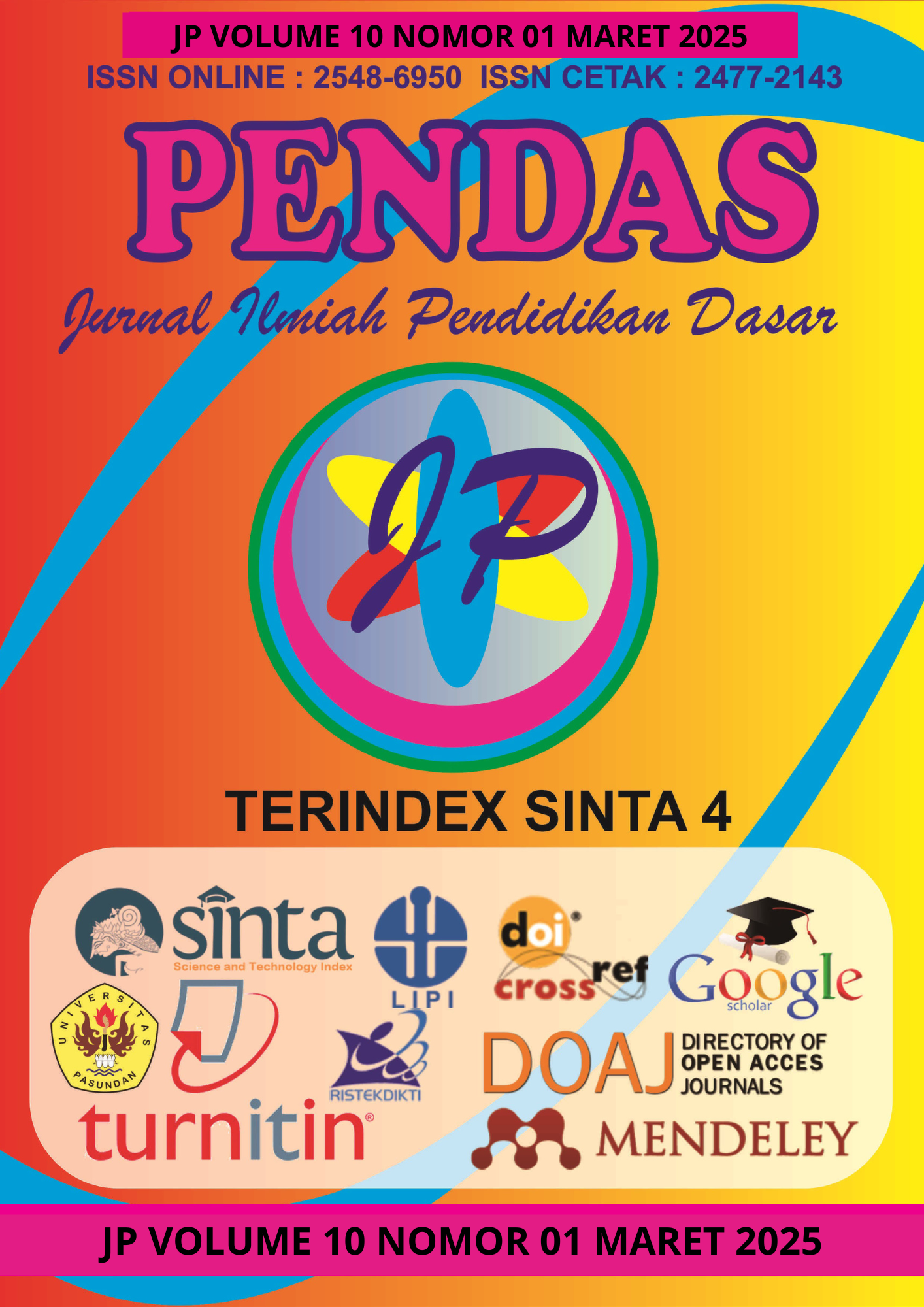UPAYA PENINGKATAN BERPIKIR KRITIS DAN HASIL BELAJAR PENDIDIKAN PANCASILA MELALUI MODEL PROBLEM BASED LEARNING (PBL) SISWA SEKOLAH DASAR
DOI:
https://doi.org/10.23969/jp.v10i01.22951Keywords:
critical thinking, learning outcomes, problem-based learningAbstract
The purpose of this study is to enhance and ezamine the critical thinking skills and learning outcomes of fourth-grade student at SD Kanisius Bedono through the Problem-Based Learning (PBL) model in the Pancasila Education subject. This research was conducted in two cycles, with each cycle consisting of two meetings. The observation students at SD Kanisius Bedono through the Problem-Based Learning (PBL) model in the Pancasila Education subject. This research was conducted in two cycles, with each cycle consisting of two meetings. The observations in the first cycle indicated that students' critical thinking skills were still in the low category, with an average score of 58, and only 12.5% of students were able to achieve the Minimum Mastery Criteria (KKTP). However, in the second cycle, there was an improvement, with the average critical thinking skill score increasing to 84.5%, and 95.8% of students successfully reaching the KKTP, due to a more structured implementation of the Problem-Based Learning (PBL) model in this cycle. The PBL model effectively encouraged students to actively engage in group discussions, identify and solve real-world problems, and exchange ideas with their classmates. This study highlights the importance of using innovative learning models to improve the quality of education, particularly in enhancing critical thinking skills at the elementary school level. The researcher hopes that schools will consistently implement the PBL model to provide students with a more meaningful and enjoyable learning experience.
Downloads
References
Anggraeni, N., Rustini, T., & Wahyuningsih, Y. (2022). Keterampilan Berpikir Kritis Siswa Sekolah Dasar pada Mata Pelajaran IPS di Kelas Tinggi. Jurnal Review Pendidikan Dasar: Jurnal Kajian Pendidikan Dan Hasil Penelitian, 8(1).
Azizah, J. F., Muzzazinah, M., & Susanti, E. (2021). Peran Keterampilan Berpikir Kritis Siswa di Sekolah Menengah Pertama pada Materi Sistem Pencernaan. SAP (Susunan Artikel Pendidikan), 6(2).
Endang, I., Tri S., & Maria, E. O. (2013). Pengetahuan Metakognitif untuk Pendidik dan Peserta Didik. Satya Widya. 29(1), 46
Faizah, H., & Rahmat, K. (2024). Belajar dan Pembelajaran. Jurnal Basicedu. 8(1). 472
Filsaime, D. K. (2008). Menguak Rahasia Berpikir Krits dan Kreatif. Jakarta: Prestasi Pustaka. 66-68.
Kristina, K., & Herry S. (2024). Upaya Peningkatan Berpikir Kritis dengan Model PBL pada Siswa Kelas 4 dalam Mata Pelajaran Pendidikan Pancasila. JIIP - Jurnal Ilmiah Ilmu Pendidikan, 7(6). 6068
Mery, S. F., & Endang, I. (2023). Penerapan Model Problem Based Learning (PBL) untuk Meningkatkan Kemampuan Berpikir Kritis dan Hasil Belajar Matematika SD. JIIP - Jurnal Ilmiah Ilmu Pendidikan, 6(12), 10132-10138.
Nurfaizah, A. P., Latri A., & Merci E. (2024). Penerapan Model Problem Based Learning untuk Meningkatkan Kemampuan Berpikir Kritis dan Hasil Belajar Siswa pada Pembelajaran Pendidikan Pancasila di Kelas IV SD INPRES KASSI-KASSI 1 Kota Makassar. Pendas: Jurnal Ilmiah Pendidikan Dasar. 9(2). 4745.
Peraturan Pemerintah. (2022). Standar Nasional Pendidikan, Nomor 4 Tahun 2022.
Rahman, S. 2021. “Pentingnya Motivasi Belajar Dalam Meningkatkan Hasil Belajar.” Merdeka Belajar 1(November):289–302.
Sukmawati, Anjelina, Y. G., Sunarto, A., & Dwi, S. (2024). Peningkatan Kemampuan Belajar Siswa Abad 21 Melalui Keterampilan 4C. Edujavare Publishing; Indonesia. 1(2). 14.
Sukowati, V. P., & Harjono, N. (2023). Penerapan Model Problem Based Learning untuk Meningkatkan Kemampuan Berpikir Kritis dan Hasil Belajar IPA Siswa Kelas V SD. JIIP - Jurnal Ilmiah Ilmu Pendidikan, 6(12).
Wasiyanti, A. T. (2021). Penerapan Model Pembelajaran Berbasis Masalah Problem Based Learning (PBL) Dalam Meningkatkan Hasil Belajar IPS Materi Kegiatan Ekonomi di Negara ASEAN Pada Siswa Kelas VI SDN Dawuhansengon II Tahun 2020. Educatif: Journal of Education Research. 3(1). 211-212.
Yaumi, & Mohammad. 2014. Prinsip-prinsip design pembelajaran. Jakarta: Kencana.
Zulhafizh, Z. (2020). Orientasi Pelaksanaan Kurikulum Pembelajaran di Tingkat Satuan Pendidikan Menengah Atas: Perspektif Guru. JURNAL PAJAR (Pendidikan Dan Pengajaran), 4(2), 303–315.
Downloads
Published
Issue
Section
License
Copyright (c) 2025 Pendas : Jurnal Ilmiah Pendidikan Dasar

This work is licensed under a Creative Commons Attribution 4.0 International License.














































